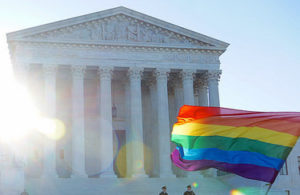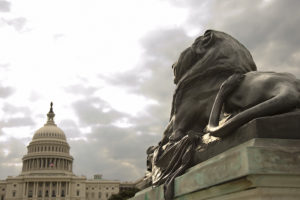
States sue EPA over air pollution, the Ninth Circuit strikes down the third version of the Trump Administration’s travel ban, and more…
IN THE NEWS
- New York and seven other states brought suit against the U.S. Environmental Protection Agency (EPA). The states asked the court to vacate EPA’s rejection of the states’ petition for EPA to increase the number of states that must adhere to standards for ozone emissions. The New York Attorney General’s office explained that the lawsuit, if successful, will “ensure upwind states adequately control the pollution that blows into New York and other downwind states.” New York Attorney General Eric T. Schneiderman (D) said, “Millions of New Yorkers are breathing unhealthy air as smog pollution continues to pour in from other states.”
- The U.S. Court of Appeals for the Ninth Circuit struck down the third version of President Donald Trump’s travel ban executive order. This version of the travel ban blocked people from eight countries—including six predominantly Muslim countries—from entering the United States. However, the Ninth Circuit ruled that the travel ban “conflicts with the Immigration and Nationality Act’s prohibition on nationality-based discrimination in the issuance of immigrant visas.”
- A judge for the U.S. District Court for the District of Columbia ordered the Presidential Advisory Commission on Election Integrity to share with Democratic commission member Matthew Dunlap all documents “necessary to inform his efforts to fully participate as a Commission member.” The judge found the Commission violated the Federal Advisory Committee Act, which seeks to prevent “unbalanced commissions.”
- The U.S. Court of Appeals for the D.C. Circuit declared that the U.S. Fish and Wildlife Service failed to adhere to the proper procedure when banning elephant hunting in 2014 and 2015. The court said the Service was incorrect to have banned elephant hunting upon the Service’s reasoning that there was simply not enough evidence of the conservation benefits of hunting; instead, the Service should have gone through the full notice-and-comment rulemaking process. The court gave the Service another chance to go through the rulemaking process.
- A judge for the U.S. District Court for the District of Columbia ruled that the U.S. Department of Housing and Urban Development (HUD) must implement the Small Area Fair Market Rents rule on January 1, 2018. HUD had planned to delay implementation of the rule, which will change the formula for calculating housing vouchers’ values, for two years. The judge ruled, however, that HUD could not delay the rule without notice-and-comment rulemaking.
- The Federal Communications Commission certified the first wireless “power-at-a-distance” charging system, WattUp. According to Energous, the company that developed WattUp, the system underwent “rigorous, multi-month testing to verify it met consumer safety and regulatory requirements.” Mark Tyndall, Senior Vice President of Corporate Development and Strategy at Dialog Semiconductor, reportedly stated this system is a “real game changer for wireless technology.”
- The U.S. Department of Health and Human Services published a report finding that contaminated food is taking too long to be removed from store shelves. According to the report, the U.S. Food and Drug Administration (FDA) “did not always have an efficient and effective food-recall process that ensured the safety of the nation’s food supply.” FDA Commissioner Scott Gottlieb stated the report “raised some significant concerns” and that FDA still has “more work to do.”
- The U.S. Department of the Interior released a memorandum reversing an Obama-era decision that denied the renewal of leases for a copper and nickel mining operation in Minnesota. In 2016, the U.S. Forest Service and the Bureau of Land Management (BLM) decided not to renew the leases for Twin Metals Minnesota and subsequently cancelled the leases. In its memo, the Interior Department concluded that BLM did not have the “discretion to deny the renewal application.”
- An attorney for the Interior Department concluded in an opinion that the Migratory Bird Treaty Act does not prevent “incidental” killing of migratory birds. Incidental killing occurs when a party does not intend the killing. Erik Milito of the American Petroleum Institute—which “applauded” the opinion—said that the “Act should not be used for overzealous enforcement of criminal penalties on those engaging in otherwise lawful activities.” But David O’Neill of the National Audubon Society condemned the opinion, saying, “By acting to end industries’ responsibility to avoid millions of gruesome bird deaths per year, the White House is parting ways with more than 100 years of conservation legacy.”
WHAT WE’RE READING THIS WEEK
- In a paper, Rebecca Bratspies of the City University of New York School of Law argued that, because there has been a “retreat” from environmental regulation at the federal level, state and local governments will implement their own environmental regulations. Bratspies highlighted the steps that New York City is taking to combat climate change, including an effort to publicize data about the City’s carbon footprint and regulations aimed at limiting the use of heating oil.
- In an article for the University of Hawai’i Law Review, Jack Harrison, a professor at the Northern Kentucky University Chase College of Law, discussed the issue of transgender bathroom access. Harrison outlined the emergence of regulation to create “sex-separation” in restroom facilities and the developing body of law protecting the rights of access for transgender persons to restroom facilities, arguing that the Supreme Court should “expand the understanding of prohibited discrimination on account of ‘sex’ under Title VII and Title IX to include transgender persons.”
- In an article for The New York Times, Winnie Hu examined whether New York City, in an effort to combat traffic, should charge customers of ride-sharing companies like Uber an extra fee for riding in Manhattan. New York Governor Andrew M. Cuomo (D) may propose this “congestion pricing plan” in January. Hu noted that other cities like Seattle, Portland, and Chicago have implemented similar charges for ride-sharing customers, but she also observed that customers are “wary of another fee.”



